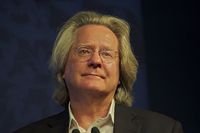A.C. Grayling vs. Rabbi Daniel Rowe debate
A.C. Grayling is a British atheist and philosopher. He is commonly called the fifth horseman of the New Atheism movement. Grayling debated Rabbi Daniel Rowe about the existence of God.
According to Dr. Michael Egnor, "Rowe devastated Grayling."[1]
Atheist Jerry Coyne said of the debate:
| “ | I have to admit to finding the prospect of an orthodox rabbi holding his own in a debate with Dr. Grayling on God's existence rather disheartening, but I'm afraid that's exactly what went down the other night in London.[2] | ” |
Coyne further declared about Grayling: "Anthony wasn't up on the responses of physicists to the "fine tuning" and "first cause" arguments for God."[3]
David Klinghoffer says of Coyne's remark about Grayling: "When your colleague and comrade evaluates your performance in a debate and says, in public, it's time to "bone up" on a fundamental subject, that's bad. Actually, I feel bad for Grayling.[4]
Contents
A.C. Grayling and illogical argumentation during the debate
See also: Atheism and logical fallacies
Michael Egnor wrote:
| “ | Grayling attributes theism to our forbearers' misplaced attribution of natural events to agency. He thereby falls prey to two fallacies: he begs the question, and he commits the genetic fallacy.
He begs the question by assuming that the inference to agency in nature is wholly in error, which is of course just the question at issue in the debate. A theist would argue that the inference to agency in nature is not entirely in error. The laws of nature -- the tendency of change in nature to work to ends -- speak powerfully to agency. This is the basis for Aquinas' Fifth Way -- the argument for God's existence based on the obvious teleology in nature. Grayling's argument that such inference to teleology is problematic for theism merely begs the question. Why exactly is nature's goal-directedness, which our forbearers saw and understood, a reason to doubt their inference to theism? What a witless argument. Grayling's second fallacy is the genetic fallacy. Even if the inference of our forbearers to teleology were a basis for the rise of theism (and it certainly was), the statement of this fact does not speak decisively to the truth or falsehood of the inference. One does not disprove an inference by describing its origin. It would make just as little sense to refute atheism by pointing out how much sense it would make for a subset of our forbearers to deny moral and eternal accountability.... What is remarkable in Grayling's opening statement is its amateurism. I have come to see in the couple of decades that I have been as a theist that this is invariable in atheists' arguments against God's existence. Atheist arguments are a parade of fallacies and hand-waving, transparently motivated by evasion and arrogance. None of their arguments withstand even cursory scrutiny. And remember that Grayling is that rare New Atheist who is a professional philosopher. How pitiful.[5] |
” |
See also
External links
Notes
- ↑ Fellow Atheist Dismayed at A.C. Grayling's Debate Performance Versus Rabbi Rowe
- ↑ Fellow Atheist Dismayed at A.C. Grayling's Debate Performance Versus Rabbi Rowe
- ↑ The Rowe-Grayling Debate by Michael Egnor
- ↑ The Rowe-Grayling Debate by Michael Egnor
- ↑ The Rowe-Grayling Debate by Michael Egnor
